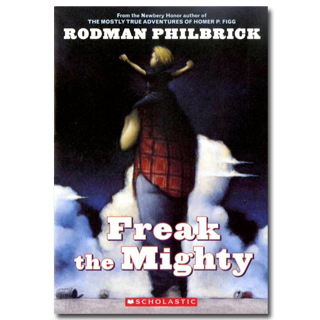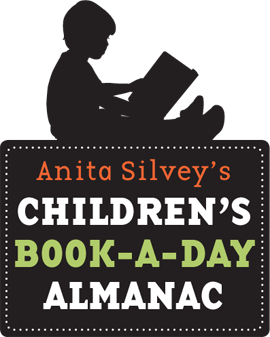
A FEW OTHER EVENTS FOR
NOVEMBER 7:
- It’s the birth date of Yuri Morales (Just in Case), Sneed Collard (Animal Dads) and Armstrong Sperry (1897–1976), Call It Courage.
- In 1874, Thomas Nast’s cartoon in Harper’s Weekly is the first use of an elephant as the symbol for the Republican party. Read When Elephant Goes to a Party by Sonia Levitin and Jeff Seaver.
- Duck and cover! In 1957, the Gaither Report calls for more Americans to build backyard fallout shelters. Read Gemini Summer by Iain Lawrence and Beyond Mayfield by Vaunda Micheaux Nelson.
- It’s National Animal Shelter Appreciation Week (November 6–12 this year). Read Martha Speaks: Shelter Dog Blues by Susan Meddaugh.
The second week of November we celebrate National Young Readers Week. I wish that all young readers had access to the books we celebrate every day on the Almanac. Today we’ll look at one, published in 1993, which I consider a contemporary classic, Rodman Philbrick’s Freak the Mighty.
When I first read this book about ten years ago, it never occurred to me that Freak the Mighty was Philbrick’s first novel for children. He’s completely in control of all the elements of the story and knows how to connect with children. Like many contemporary writers for the young, Philbrick had already polished his craft writing adult novels and mysteries. An editor suggested he might try a mystery book for children, but the idea that haunted him had nothing to do with that initial proposal. Philbrick thought of a boy he knew who was born with Morquio Syndrome, a rare form of dwarfism. Very bright, with great courage and curiosity, the boy possessed an amazing vocabulary. He had died the year before, and Philbrick realized that that boy would make an incredible character for a novel.
Freak the Mighty is narrated by Maxwell, considered huge, lumbering, dumb, and slow by all those who know him. Here’s his opening gambit: “I never had a brain until Freak came along, and let me borrow his for a while. And that’s the truth, the whole truth.” Son of a convicted killer, Max, sometimes called Mad Max, spends a lot of time in remedial classes. Raised by his grandparents, he lives in the cellar and has little to motivate him. But then Gwen and her son Kevin, who suffers from dwarfism, move in next door. One night Max takes Kevin to the fireworks and places him on his shoulders to get a better view. And from then on the two become inseparable, Freak the Mighty. They fight off bullies, get into all kinds of action, and slowly Kevin, a genius with a great way of expressing himself, educates and challenges his friend. Max leans to read and even writes their story.
A three-handkerchief book, Freak the Mighty deals with a lot of important issues as it pulls readers along in a funny, fast-paced story. The book has became part of the teaching curriculum across the country, and whether read in fifth or seventh grade, Freak the Mighty captivates young readers. Most of them, that is. Philbrick has recently published a fascinating ebook that explores his views about books for children, Listening to Kids in America. It contains some praise, but also some harsh words: “All the time we had to read your book I was thinking where’s writers block when you need it?” one child quipped.
Well, I for one am grateful that Rodman Philbrick did not suffer from writer’s block while creating Freak the Mighty. In Philbrick’s fiction, including The Mostly True Adventures of Homer P. Figg, he demonstrates his genius for writing a literary novel that children want to read. He began brilliantly with Freak the Mighty; he has simply gotten better as a writer over the years.
Here’s a passage from Freak the Mighty:
Freak sighs and rolls his eyes. “Ah, yes,” he says. “Television, the opiate of the massives.”
For about the eleventh time I go, “Huh?”
“Opiate, a drug,” he says. “Massive, that means large and heavy. Thus television is the drug of fat heads. Opiate of the massives.”
“You don’t have a TV?”
“Of course I have a television,” he says. “How else could I watch Star Trek? Matter of fact, I watch tons of tube, but I also read tons of books so I can figure out what’s true and what’s fake, which isn’t always easy. Books are like truth serum—if you don’t read, you can’t figure out what’s real.”
Originally posted November 7, 2011. Updated for 2019.






This is such a wonderful book! I remember reading this in high school and absolutely loving it. Thanks for sharing this one, Anita!
Oh how I loved this book growing up, My mom and I had the audiobook and I listened to it so many times.
This sounds intriguing, I’m looking forward to reading this one.
And there’s one of those lines again!
“if you don’t read, you can’t figure out what’s real.”
And, that line is profoundly true.
I missed this one somehow! I will put it on my list. Thanks for highlighting such a great selection of books. I love hearing stories about my favorites and finding new soon-to-be-favorites as well!
I love reading your side notes each day. A 2010 book that also addresses the “Duck and Cover” theme is COUNTDOWN by Deborah Wiles. An interesting slice-of-life of those times. Very nostalgic for me having been a kid during the 60s.
Nita: Thanks for reminding me of the Deborah Wiles title.
Love “Freak the Mighty.” We own it and I look forward to sharing it later with my child. If you love the book, you may also enjoy the movie adaptation, “The Mighty.” I saw the movie (with Gena Rowlands, Harry Dean Stanton, Kieran Culkin, and Sharon Stone, among others) after reading the book and it’s wonderful.
Thank you ! I read this to my 7th graders in the 90’s. The school librarian recommended It to me as a great read-aloud not knowing one of my students had dwarfism. I checked in with him and we decided to go for it. The conversations we had as a class were rich. That read-aloud and those discussions are one of the highlights of my 34 years of teaching.